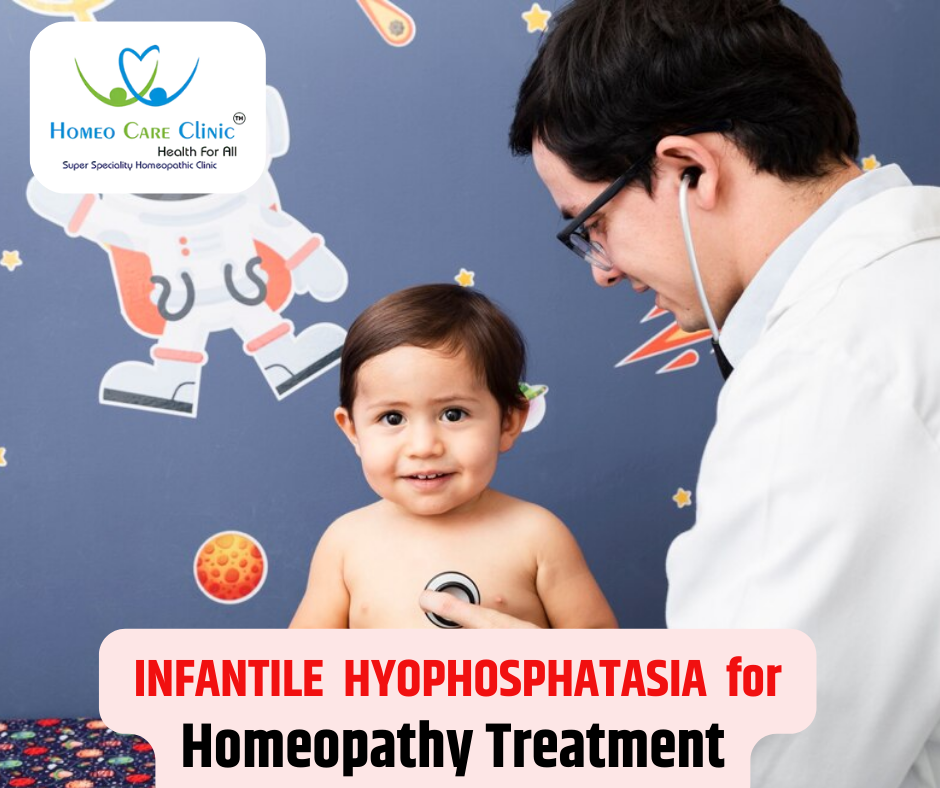Infantile hypophosphatasia is a rare genetic disorder characterized by defective bone and tooth mineralization. It results from mutations in the ALPL gene, leading to insufficient activity of the tissue-nonspecific alkaline phosphatase (TNSALP) enzyme. This enzyme is crucial for proper bone and teeth development.
CAUSES:
-
Genetic Mutation:
– ALPL Gene Mutations in the ALPL gene on chromosome 1 cause a deficiency of alkaline phosphatase, affecting bone and teeth mineralization.
-
Autosomal Recessive Inheritance:
– Inheritance Pattern: Typically, HPP follows an autosomal recessive pattern, meaning both parents must carry a copy of the mutated gene for a child to be affected.
SIGNS AND SYMPTOMS:
-
Skeletal Abnormalities:
– Soft and Deformed Bones: Due to impaired mineralization, bones are soft, weak, and prone to deformities.
– Short Stature: Delayed growth and short stature are common.
-
Respiratory Issues:
– Respiratory Complications: Weak ribs and chest deformities may lead to respiratory problems.
-
Dental Problems:
– Early Tooth Loss: Defective tooth mineralization leads to premature loss of primary (baby) teeth.
– Dentinogenesis imperfecta: discoloration and malformation of teeth due to mineralization issues.
-
Muscle Weakness:
– Hypotonia: Weak muscle tone, affecting motor development.
-
Intracranial Hypertension:
– Elevated Pressure in the Skull: Some infants may experience increased pressure within the skull, leading to symptoms like irritability and vomiting.
-
Hypercalcemia:
– Elevated Blood Calcium Levels: Impaired bone mineralization can release excess calcium into the bloodstream, leading to hypercalcemia.
-
Failure to Thrive:
– Poor Growth: Due to skeletal and developmental challenges, affected infants may struggle with weight gain and overall growth.
Early diagnosis is crucial for managing symptoms and providing supportive care.
HOMEOPATHIC APPROACH IN INFANTILE HYPOPHOSPHATASIA:
Homeopathy is a holistic approach that believes in treating individuals based on their unique symptoms and overall well-being. In the context of infantile hypophosphatasia, a homeopathic practitioner might consider various factors, such as physical symptoms, mental and emotional states, and lifestyle. Majorly, it considers the emotional and cerebral aspects of the person. It not only works on diseased conditions but aims to cure the case as a whole.
HOMEOPATHIC MEDICINES FOR INFANTILE HYPOPHOSPHATASIA :
1. Calcarea Phosphorica (Calc Phos):
Indications: weakness and softness of bones, slow development, and delayed dentition.
Symptoms: delayed closure of fontanelles, difficulty in learning to walk, and a tendency to fractures.
2..Silicea (Silica):
Indication: Fragility of bones with delayed healing, especially when associated with constitutional weakness.
Symptoms: Brittleness of bones, delayed closure of fontanelles, and poor resistance to infections.
3. Symphytum Officinale (Symphytum):
Indication: Helpful for fractures and injuries, especially if there are skeletal deformities.
Symptoms: Supports healing of fractures, alleviates pain, and aids in strengthening bones.
4. Phosphorus:
Indication: bone and tooth problems with a tendency to early decay.
Symptoms: fragile bones, early tooth loss, and susceptibility to respiratory infections.
5. Baryta carbonica (Baryta Carb):
Indication: delayed development and weakness, especially in children with a slow learning curve.
Symptoms include delayed milestones, mental and physical weakness, and infection susceptibility.
CONCLUSION:
It’s important to reiterate that a good homeopath should specify homeopathic remedies after thoroughly evaluating the patient’s symptoms, medical history, and overall health. Dr. Vaseem Choudhary’s “Homoeo Care Clinic” is known for furnishing treatment for infantile hypophosphatasia through a holistic approach.






